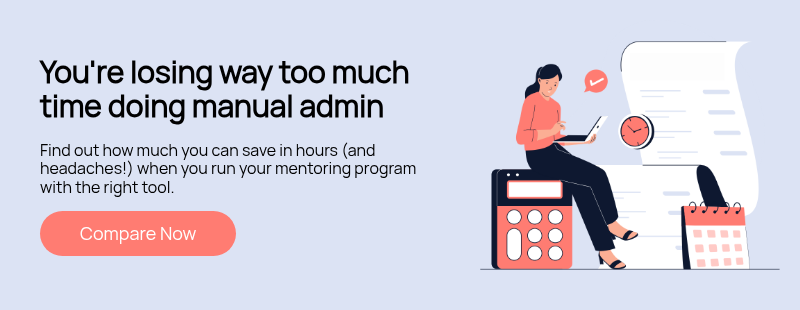The AI Boom in Professional Development
Artificial intelligence is no longer just a buzzword from the tech world; it’s now a driving force in how we learn and grow at work. With 45% of companies already deploying AI at scale, its impact on learning and development is accelerating fast (Gitnux Report 2025).
This shift prompts an important question: how is AI actually changing professional development? And what does it mean for organizations and associations who want to stay relevant, competitive, and supportive of their people?
What the Market is Saying: Stats and Projections
The demand for AI-enabled education is booming. Valued at $16.2 billion in 2024, the market is projected to grow more than 22% annually, showing just how central AI is becoming in the workplace (Validated Insights Report).
It’s not just organizations paying attention. Enrollment in AI programs at universities grew 45% every year between 2018 and 2023. Add to that the surge in online courses, and it’s clear people are seeking flexible, accessible ways to upskill. AI isn’t a niche topic anymore — it’s shaping the future of every career path.
How AI is Transforming the Way We Learn
The most exciting thing about AI in professional development is how many touchpoints it’s improving:
- Personalized learning paths – AI tailors training to each learner’s needs, ensuring it’s both relevant and engaging
- Adaptive training systems – adjusting in real-time to how someone is progressing.
- Mentoring programs – smarter matching based on skills, goals, and compatibility.
Performance tracking – deeper insights into outcomes, helping L&D teams fine-tune and demonstrate impact.
AI doesn’t just help individuals learn more effectively — it gives organizations visibility into skill gaps and future needs, so they can stay ahead of change.
Where AI Makes a Difference
When it comes to benefits, three big ones stand out:
Scalability – AI makes it possible to deliver high-quality, personalized experiences to thousands of people all at once.
Efficiency – by automating admin tasks like scheduling, assessments, and feedback collection, it frees L&D leaders to focus on strategy and people.
Personalization – learners get what they need, when they need it, which speeds up skill acquisition and keeps them engaged.
On top of this, AI can forecast future training needs by spotting trends in performance data — something that used to take months of analysis. In fact, AI-driven data visualization improves insight accuracy by 37%, giving leaders confidence in their decisions (ZipDo Education Reports 2025).
Why Organizations and Associations Are Taking Notice
The Pressure to “Future-Proof”
There’s no avoiding it: AI is reshaping jobs. 82% of business leaders say employees will need new skills to work effectively alongside AI (Chief Learning Officer). Yet, only 38% of companies actually offer AI-related training today. That’s a big gap and a big opportunity for those who move quickly.
Organizations that help people reskill and adapt won’t just keep up with change, they’ll stand out as employers of choice. Associations, too, can become the go-to resource for preparing industries to thrive in an AI-powered world.
Meeting the Needs of Every Learner
No two learners are the same. Early-career professionals, mid-level managers, and senior leaders all need different kinds of support. AI helps by tailoring experiences to each individual.
What’s more, positive attitudes toward AI strongly predict the adoption of generative AI tools, according to Jennifer Haase’s research. That means building not just technical skills but also confidence and literacy around AI can accelerate adoption and impact.
Associations as Learning Hubs for Members
Industry associations are perfectly placed to bring this to life. By offering AI-enhanced mentoring, adaptive learning, and performance analytics, they can help members stay competitive and connected.
With access to aggregated data, associations can even spot industry-wide skill gaps and offer programs to close them. This allows them to create real value for members while strengthening their role as leaders in professional development.
How to Bring AI Into Your Learning Strategy
Are You Ready? Assessing AI Readiness
Before jumping in, organizations need to ask: are we ready? That means looking at infrastructure, staff AI literacy, and openness to innovation.
Barriers are real. Research shows that while some professionals increase AI tool use by 11% despite challenges, lack of training resources can reduce adoption by 8% (Pablo Dorta-González et al.). Investing in the right training and support makes all the difference.
Are You Ready? Assessing AI Readiness
Before jumping in, organizations need to ask: are we ready? That means looking at infrastructure, staff AI literacy, and openness to innovation.
Barriers are real. Research shows that while some professionals increase AI tool use by 11% despite challenges, lack of training resources can reduce adoption by 8% (Pablo Dorta-González et al.). Investing in the right training and support makes all the difference.
Building an AI-Powered Learning Ecosystem
The best results come from ecosystems, not point solutions. Think: AI-driven content curation, adaptive platforms, and analytics dashboards all working together.
A smart move is to start small: pilot AI tools with one team or program, learn what works, and then scale. Building in feedback loops keeps the ecosystem agile as new tech emerges and learner needs evolve.
Mentoring in the Age of AI
Mentoring has always been a cornerstone of development — and AI is making it even better. From smarter mentor-mentee matching to AI-generated agendas and progress tracking, these tools help mentors focus on the human connection while the platform takes care of the admin.
The trick is balance: letting AI handle logistics and insights, while mentors bring empathy, experience, and accountability.
Mentoring Software: Where AI Shines
Mentoring software is one of the clearest examples of AI’s value. Platforms like Mentorloop simplify the day-to-day: matching mentors and mentees, nudging them along, surfacing insights — so program managers can spend their energy on impact, not admin.
For mentees, AI-driven recommendations mean the right resources, at the right time, on the right journey. For mentors, it’s an amplifier, helping them give richer, more relevant support. And for organizations, it’s proof that mentoring can scale while still feeling personal.
Looking Ahead: Opportunities and Challenges
Tackling Ethics and Bias in AI
AI isn’t without its challenges. Data privacy, bias, and transparency need to be addressed head-on. Associations, in particular, have a chance to lead on ethical standards and set the bar for safe, responsible adoption.
Equipping Leaders and Members With AI Skills
It’s not just learners who need AI skills, leaders and association members do too. Training for decision-makers demystifies AI and helps them think strategically about where and how to apply it. Associations offering this kind of support will position themselves as trusted guides in a fast-changing landscape.
At the end of the day, embracing AI in professional development isn’t about replacing people. It’s about creating a culture of continuous learning, adaptability, and opportunity.
Transform Your Organization’s Mentorship with Mentorloop
Ready to bring the best of AI into your professional development strategy? Mentorloop helps you match mentors and mentees with precision, streamline the admin, and unlock powerful insights into program success.
With Mentorloop, mentoring stays human at its core — but with AI working in the background to make everything smoother, smarter, and more scalable.
👉 Book a demo today and see how AI-powered mentoring can transform growth in your organization.





